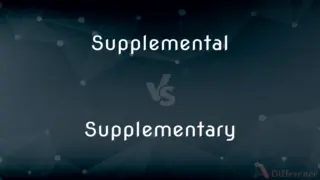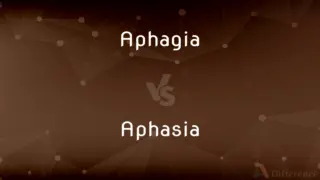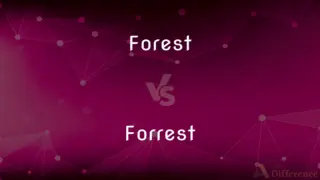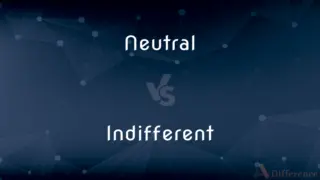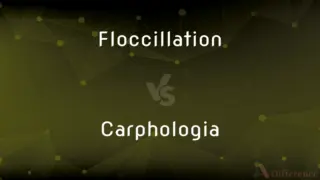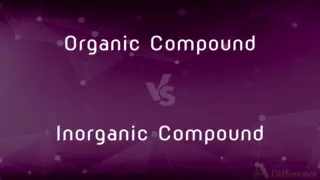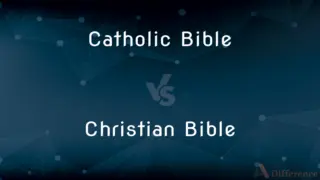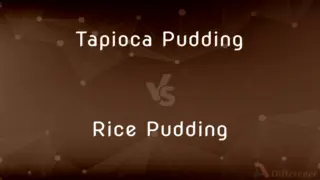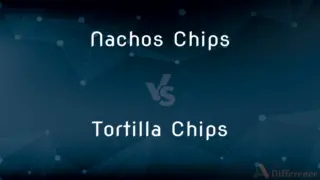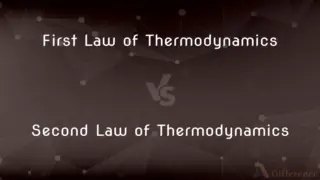Madder vs. Matter — What's the Difference?
By Tayyaba Rehman & Fiza Rafique — Updated on April 9, 2024
Madder is a plant used for dyeing, while matter refers to substance or material.
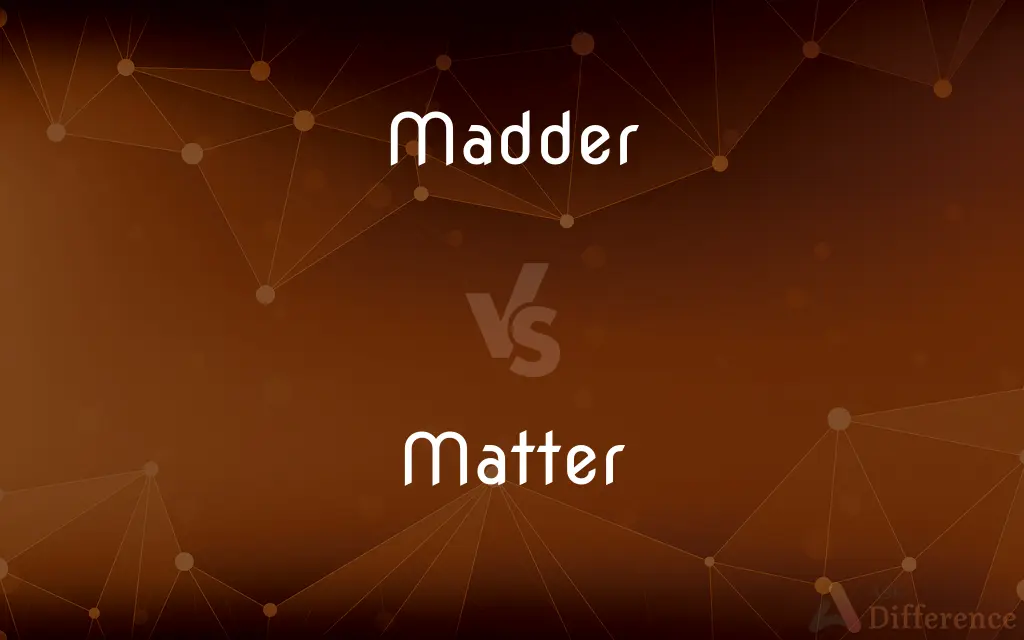
Difference Between Madder and Matter
Table of Contents
ADVERTISEMENT
Key Differences
Madder is a perennial plant known for its roots that produce red dye, historically significant in textiles. On the other hand, matter encompasses any substance that occupies space and has mass, including solids, liquids, gases, and plasma. This broad categorization distinguishes physical substances from concepts or phenomena without physical presence.
The term "madder" specifically relates to the Rubia tinctorum species, cultivated for its dye-producing capabilities, a natural source of red pigment used since ancient times. Whereas matter, a fundamental concept in physics and chemistry, is essential for understanding the physical universe, including everything from stars and planets to everyday objects.
Cultivation and use of madder in dyeing and art highlight human cultural and technological advancements, showcasing the application of natural resources in crafts and industries. Matter, by its very nature, forms the basis of all physical existence and scientific study, from the microscopic scale of atoms and molecules to the vastness of cosmological structures.
Madder's relevance is primarily within historical, cultural, and artistic contexts, emphasizing its role in traditional dyeing techniques and its impact on fashion and art throughout history. In contrast, matter is a foundational element in science, crucial for the exploration and understanding of physical laws and the structure of the universe.
Despite their vastly different realms of relevance—madder in the domain of natural dyes and historical artistry, and matter in the realm of physical science—both terms reflect the diverse ways humans interact with and seek to understand the natural world. Madder represents a specific, practical application of natural resources, while matter encompasses the broad, fundamental components of the physical universe.
ADVERTISEMENT
Comparison Chart
Definition
A plant used historically for producing red dye.
Anything that occupies space and has mass.
Context
Historical dyeing, textiles, and art.
Physics, chemistry, and general science.
Primary Relevance
Cultural and artistic, related to dye production.
Fundamental in understanding the physical universe.
Examples
Dyeing fabrics red, producing natural pigments.
Solids, liquids, gases, and plasma.
Significance
Historical significance in textiles and art.
Essential concept for the study of physical laws and structures.
Compare with Definitions
Madder
The specific species known for dye production.
Rubia tinctorum roots were cultivated extensively for madder dye.
Matter
Occupies space and has mass.
Scientists study the properties of matter in different states.
Madder
Valued in historical textile production.
Madder-dyed garments were a status symbol in some cultures.
Matter
Exists as solids, liquids, gases, and plasma.
Water is used to demonstrate matter's states: ice, liquid, and steam.
Madder
A plant traditionally used for its red dyeing properties.
Historians study madder to understand ancient dyeing techniques.
Matter
Central to the study of physical laws.
Understanding matter is crucial for advancements in physics.
Madder
Considered in modern eco-friendly dyeing practices.
Madder is researched for sustainable textile coloring methods.
Matter
Composed of atoms and molecules.
Chemical reactions involve the transformation of matter.
Madder
Influential in art and decoration.
Madder dye was used for coloring fabrics in historic tapestries.
Matter
Constitutes the physical universe.
Astrophysicists explore the distribution of matter in the cosmos.
Madder
Any of several plants of the genus Rubia, especially R. tinctorum of Eurasia, having small yellow flowers, whorled leaves, and a reddish-brown root.
Matter
In classical physics and general chemistry, matter is any substance that has mass and takes up space by having volume. All everyday objects that can be touched are ultimately composed of atoms, which are made up of interacting subatomic particles, and in everyday as well as scientific usage, "matter" generally includes atoms and anything made up of them, and any particles (or combination of particles) that act as if they have both rest mass and volume.
Madder
The root of R. tinctorum, formerly an important source of the dye alizarin.
Matter
Physical substance in general, as distinct from mind and spirit; (in physics) that which occupies space and possesses rest mass, especially as distinct from energy
The structure and properties of matter
Madder
A red dye obtained from these roots.
Matter
A subject or situation under consideration
Financial matters
A great deal of work was done on this matter
Madder
A medium to strong red or reddish orange.
Matter
The reason for distress or a problem
What's the matter?
Madder
A herbaceous plant, Rubia tinctorum, native to Asia, cultivated for a red-purple dye (alizarin) obtained from the root.
Matter
The substance or content of a text as distinct from its style or form.
Madder
The root of the plant, used as a medicine or a dye.
Matter
Be important or significant
It doesn't matter what the guests wear
What did it matter to them?
Madder
A dye made from the plant.
Matter
(of a wound) secrete or discharge pus.
Madder
A deep reddish purple colour, like that of the dye.
Matter
That which occupies space and has mass; physical substance.
Madder
Obsolete form of mether
Matter
A type of such substance
Organic matter.
Madder
Of a deep reddish purple colour, like that of the dye.
Matter
Discharge or waste, such as pus or feces, from a living organism.
Madder
A plant of the genus Rubia (Rubia tinctorum). The root is much used in dyeing red, and formerly was used in medicine. It is cultivated in France and Holland. See Rubiaceous.
Matter
(Philosophy) In Aristotelian and Scholastic use, that which is in itself undifferentiated and formless and which, as the subject of change and development, receives form and becomes substance.
Madder
Eurasian herb having small yellow flowers and red roots formerly an important source of the dye alizarin
Matter
The substance of thought or expression as opposed to the manner in which it is stated or conveyed.
Madder
Color a moderate to strong red
Matter
A subject of concern, feeling, or action
Matters of foreign policy.
A personal matter.
Matter
Trouble or difficulty
What's the matter with your car?.
Matter
An approximated quantity, amount, or extent
The construction will last a matter of years.
Matter
Something printed or otherwise set down in writing
Reading matter.
Matter
To be of importance
"Love is most nearly itself / When here and now cease to matter" (T.S. Eliot).
Matter
(uncountable) Material; substance.
Matter
(physics) The basic structural component of the universe, usually having mass and volume.
Matter
(physics) Matter made up of normal particles, not antiparticles.
Matter
A kind of substance.
Vegetable matter
Matter
Material, especially in books or magazines.
He always took some reading matter with him on the plane.
Matter
(philosophy) Aristotelian: undeveloped potentiality subject to change and development; formlessness. Matter receives form, and becomes substance.
Matter
An affair, condition, or subject, especially one of concern or (especially when preceded by the) one that is problematic.
Is much the matter with the old plan?
Something is the matter with him.
State matters
Matter
An approximate amount or extent.
I stayed for a matter of months.
Matter
(obsolete) essence; pith; embodiment.
Matter
(obsolete) (The) inducing cause or reason, especially of anything disagreeable or distressing.
Matter
To be important.
The only thing that matters to Jim is being rich.
Sorry for pouring ketchup on your clean white shirt! - Oh, don't worry, it does not matter.
Matter
To care about, to mind; to find important.
Matter
To form pus or matter, as an abscess; to maturate.
Matter
That of which anything is composed; constituent substance; material; the material or substantial part of anything; the constituent elements of conception; that into which a notion may be analyzed; the essence; the pith; the embodiment.
He is the matter of virtue.
Matter
That of which the sensible universe and all existent bodies are composed; anything which has extension, occupies space, or is perceptible by the senses; body; substance.
Matter
That with regard to, or about which, anything takes place or is done; the thing aimed at, treated of, or treated; subject of action, discussion, consideration, feeling, complaint, legal action, or the like; theme.
Son of God, Savior of men! Thy nameShall be the copious matter of my song.
Every great matter they shall bring unto thee, but every small matter they shall judge.
Matter
That which one has to treat, or with which one has to do; concern; affair; business.
To help the matter, the alchemists call in many vanities out of astrology.
Some young female seems to have carried matters so far, that she is ripe for asking advice.
Matter
Affair worthy of account; thing of consequence; importance; significance; moment; - chiefly in the phrases what matter? no matter, and the like.
A prophet some, and some a poet, cry;No matter which, so neither of them lie.
Matter
Inducing cause or occasion, especially of anything disagreeable or distressing; difficulty; trouble.
And this is the matter why interpreters upon that passage in Hosea will not consent it to be a true story, that the prophet took a harlot to wife.
Matter
Amount; quantity; portion; space; - often indefinite.
Away he goes, . . . a matter of seven miles.
I have thoughts to tarry a small matter.
No small matter of British forces were commanded over sea the year before.
Matter
Substance excreted from living animal bodies; that which is thrown out or discharged in a tumor, boil, or abscess; pus; purulent substance.
Matter
That which is permanent, or is supposed to be given, and in or upon which changes are effected by psychological or physical processes and relations; - opposed to form.
Matter
Written manuscript, or anything to be set in type; copy; also, type set up and ready to be used, or which has been used, in printing.
Waller, with Sir William Balfour, exceeded in horse, but were, upon the whole matter, equal in foot.
Matter
To be of importance; to import; to signify.
It matters not how they were called.
Matter
To form pus or matter, as an abscess; to maturate.
Matter
To regard as important; to take account of; to care for.
He did not matter cold nor hunger.
Matter
That which has mass and occupies space;
An atom is the smallest indivisible unit of matter
Matter
A vaguely specified concern;
Several matters to attend to
It is none of your affair
Things are going well
Matter
Some situation or event that is thought about;
He kept drifting off the topic
He had been thinking about the subject for several years
It is a matter for the police
Matter
A problem;
Is anything the matter?
Matter
(used with negation) having consequence;
They were friends and it was no matter who won the games
Matter
Written works (especially in books or magazines);
He always took some reading matter with him on the plane
Matter
Have weight; have import, carry weight;
It does not matter much
Common Curiosities
Can madder dye be used in modern textiles?
Yes, madder dye is still used in traditional and eco-friendly textile productions.
How does matter differ from concepts like energy?
Matter refers to substances with mass and volume, while energy is a capacity to do work, lacking physical substance.
What is madder used for?
Madder is used for producing red dye from its roots, historically significant in textile dyeing.
What is the significance of studying matter in science?
Understanding matter is fundamental to physics and chemistry, essential for exploring physical laws and the structure of the universe.
How is madder cultivated?
Madder is cultivated for its roots, which are harvested to produce natural red dye.
What historical cultures utilized madder dye?
Cultures across Europe, Asia, and the Middle East have historically used madder dye.
Is all matter visible?
Not all matter is visible; some, like gases or microscopic particles, can be invisible to the naked eye.
How do the states of matter change?
Matter changes states through physical processes like melting, freezing, condensation, and evaporation.
How do physical and chemical changes affect matter?
Physical changes alter the state or appearance of matter without changing its composition, while chemical changes alter its chemical structure.
Are synthetic dyes derived from madder?
Synthetic dyes have been developed to mimic the color of madder, but genuine madder dye comes from the plant itself.
What role does matter play in the universe?
Matter, along with energy, forms the fundamental components of the universe, from galaxies to living organisms.
How is madder dye extracted from the plant?
The dye is extracted from the dried and crushed roots of the madder plant, often through boiling or chemical processes.
Can matter exist in forms other than solids, liquids, and gases?
Yes, plasma is another state of matter, and there are also exotic states like Bose-Einstein condensates under extreme conditions.
What are the environmental impacts of using madder dye?
Madder dye is considered environmentally friendly compared to synthetic dyes, as it is biodegradable and less polluting.
Why is the study of matter important in technology?
Understanding matter's properties enables the development of new materials and technologies, from electronics to sustainable energy solutions.
Share Your Discovery

Previous Comparison
Z vs. W
Next Comparison
Transformation vs. ConversionAuthor Spotlight
Written by
Tayyaba RehmanTayyaba Rehman is a distinguished writer, currently serving as a primary contributor to askdifference.com. As a researcher in semantics and etymology, Tayyaba's passion for the complexity of languages and their distinctions has found a perfect home on the platform. Tayyaba delves into the intricacies of language, distinguishing between commonly confused words and phrases, thereby providing clarity for readers worldwide.
Co-written by
Fiza RafiqueFiza Rafique is a skilled content writer at AskDifference.com, where she meticulously refines and enhances written pieces. Drawing from her vast editorial expertise, Fiza ensures clarity, accuracy, and precision in every article. Passionate about language, she continually seeks to elevate the quality of content for readers worldwide.

